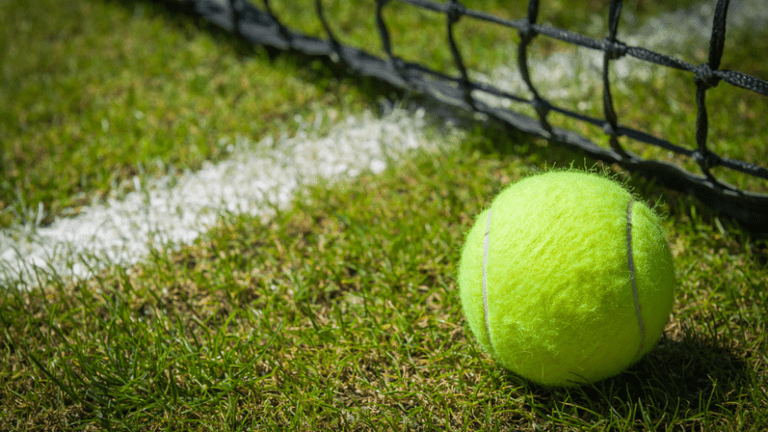Your Personality Is Your Game
Remember when you learned to write cursive letters from a chart of perfect letters? If we all were given the same examples to copy, why is it we all have different handwritings? How does your handwriting differ from the “perfect” letter chart? Where did you get that silly “s” and that funny “t”?
Now ask yourself these questions as it pertains to tennis: How do your tennis strokes differ from the “perfect” strokes? Where did you get that silly slice and that funny service motion? Where does all this variation enter the process?
In some cases, the variation is physical, that is, the tennis swing of a tall person with long arms and the swing of a short person with short arms will simply look different.
Okay, but what about the rest?
Why do some people naturally slice backhands and others hit topspin? Why do some people hit the ball on the rise and others on the fall? Why do some players go to the net on balls that others don’t? Why is it that some of your unique strokes work well and others don’t work at all?
Could it be that all this variability is due to the personality of the hitter? People who do handwriting analysis certainly believe that your handwriting is a wealth of information about you. Some of that seems logical: if you are neat and orderly, your handwriting probably will be as well. If you are shy you might write little and if you are loud, you might write big. If you are stylish, your handwriting will be stylish too.
Well, if it were reasonable that at least some of our personality is showing up in our handwriting, wouldn’t it be equally true that our personality is in our tennis games as well? And those qualities that you see in a tennis game are the ones you would expect to see in tennis: decisiveness, assertiveness, creativity, perseverance, consistency, etc.
I have found that if you put a few parts of your tennis game together, you will get a good look at your personality.
Since we are most concerned with the parts of our game that aren’t working, I suggest you start there. Write down as many of your tennis problems as you can and then see if you can’t find a personality trait that matches up with your struggle.
Here is an example — a particular junior tennis player had these problems:
-
He starts off matches badly and falls behind early.
-
He has a bad hitch in his serve.
-
He seems to be late getting to the ball, especially balls he has to move forward and aggressively on.
-
He gets his racquet back late and has a short backswing.
-
He frequently hits groundstrokes leaning backward and behind his body.
-
He sometimes lets overheads bounce when he should hit them out of the air.
Okay, I’ll stop there. What’s up with this kid? Suppose I told you that his friends told me that he is frequently late to class, rarely finishes a test in school, and he always puts off projects until the due date is getting close. Does that give you enough of a hint?
He is a procrastinator. He has a busy mind that results in a hesitation and or a delay that shows up everywhere, tennis too. Do you see the connection now? His serve suffers because as a procrastinator he can’t get stuff started. He is particularly hesitant when he has to be aggressive like when he is moving forward or hitting overheads. This is just the type of behaviors you would expect from a procrastinator on a tennis court.
So by combining what you know about yourself, with the tennis symptoms, you can find what personality trait is impacting your game.
Try this one — I had a female tennis player that had this game.
-
She didn’t seem to go for enough on each stroke, hitting up the middle a lot.
-
She has a tight backswing and follow through and impacts the ball a little too close to their body.
-
She doesn’t go to the net unless she really has to.
-
She floats approach shots when she does hit them.
-
She is not comfortable at the net
-
She hits a pretty good first serve but a really safe soft second serve.
-
She usually hits a lob instead of a passing shot, even when there is a decent opportunity to pass.
What if I told you that this woman has all her money in her savings account and never eats fish in restaurants because she doesn’t know how old it is?
Well, this woman is just very cautious. She is uncomfortable taking risks, like going for a winner, hitting a hard second serve, or a passing shot. She opts for the safe alternative in life and in tennis.
So what can you do about it?
With a handwriting analysis, no one is trying to “fix” your handwriting, but in tennis, this information is useless if you can’t do anything about it.
First of all, just knowing what your “stuff” is will help you modify your behavior. You will start to notice your those little things everywhere and that can be very motivating to change. For some tennis players, the thought that they might improve if they weren’t such a procrastinator, might serve as the motivation to do something about it.
So, if you are aware of your procrastinating ways and are watching for them on the court, you might begin to notice yourself losing points because you didn’t move to the net fast enough. That would serve as negative reinforcement. If then you got another short ball and went to the net more quickly and got good results that would serve as positive reinforcement. It is simply the awareness of the trait that begins this process. If you can even mildly affect that personality trait, you will begin to get good results, and the results act as a reward to continue to grow.
Let me stress that the improvements will show up in many areas of your game at once, spontaneously, and even show up in some areas you didn’t realize were connected. For example, the procrastinator might discover a realization like that: “When I used to get dragged out wide to my forehand, I would always be late getting to those so I would have to try to go up the line, but now I get an earlier jump and feel like I can go cross-court also.”
Get it? The procrastination was showing up all over his game.
But here is the real bonus to learning through personality adjustment, when you deal with your procrastination on the court, the effects carry over, off the court into life. After all, you have altered an attitude. When you learn to change your tennis game in the traditional way, you only affect body parts. When you improve by altering your attitude you not only mature as a player, you mature as a person.
It’s a real nice bonus.
How useful was this post?
Click on a star to rate it!
Average rating 3.6 / 5. Vote count: 5
No votes so far! Be the first to rate this post.



